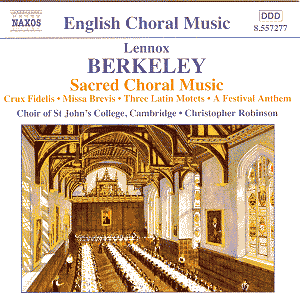Lennox Berkeley joined the Roman Catholic Church
in 1928 and for the rest of his life his strong personal faith
was a significant part of his life. His composing career covered
a whole variety of genres and his liturgical music does not, alas,
loom very large in our current narrow view of his output. Luckily,
in his centenary year, this limited view of Berkeley is being
expanded. Chandos are producing the excellent Berkeley edition
with pairings of works by Lennox and his son, Michael Berkeley;
‘Ruth’ is evidently in the pipeline; and Naxos have issued this
wonderful disc of his liturgical music recorded by the choir of
St. John’s College, Cambridge - a choir for whom three of the
motets on this disc were written.
I suppose the surprising thing for me was to
discover the amazing consistency of Berkeley’s vision when writing
liturgical music. This is especially true of the Latin works,
which make up the majority of the pieces on the disc. The excellent
notes quote Berkeley as saying, in 1966, ‘Being a Roman Catholic,
I have naturally been drawn to the Latin liturgy and felt at home
with it; it’s part of my life, and I have wanted to bring to it
what I have to offer, however unworthy’. Berkeley’s musical language
is not the cool meditative chant-based music that is currently
voguish. Nor is it completely English pastoral, though he can
put the mood on when he wants. Just listen to the haunting opening
of ‘The Lord is my Shepherd’, a beautiful treble solo (beautifully
sung too) which would grace the work of many of his fellow composers.
But the disc opens with ‘Crux Fidelis’, a setting from 1955 originally
sung by the very Britten-ish Peter Pears and the Purcell Singers,
conducted by Imogen Holst. This is tough music; I don’t mean difficult,
though it can be. But it is chromatic and strong, almost gritty
at times. Berkeley’s faith does not seem to have been the easy
chair variety. This is music that is questing and questioning.
This gritty quality is carried forward right until the Three Latin
motets of 1972 which were written for the choir of St. John’s.
In the first motet, the pain of the text (‘Eripe me, Domine’ –
‘Deliver me, O Lord’) is matched by Berkeley’s stark and dissonant
harmony. And the apparently lyrical, flowing second motet (‘Veni
sposa Christi’ – ‘Come thou Bride of Christ’) ends by teetering
on an unresolved discord. This is music which requires sterling
accuracy when placing notes and that is what it gets from St.
John’s College who scarcely seem to put a foot wrong and make
even the tougher passages sound right and proper.
When setting English or writing for the Anglican
Church, hints of the English organ loft creep in to the music.
The very late Magnificat and Nunc Dimittis were his only works
explicitly setting part of the Anglican liturgy and were written
for the combined choirs of Salisbury, Winchester and Chichester.
As I have already mentioned, the setting of ‘The Lord is my Shepherd’
also partakes of this quality. It was written for Chichester Cathedral,
dedicated to that redoubtable supporter of the arts, Dean Walter
Hussey.
‘A Festival Anthem’, the last choral piece on
the disc, could be seen as a follow up to ‘Rejoice in the Lamb’.
Britten wrote ‘Rejoice in the Lamb’ for Walter Hussey for the
1943 Patronal Festival at St. Matthew’s, Northampton. Britten
recommended Berkeley for the 1945 commission and the resulting
work was dedicated to Hussey. It is a big piece (12 minutes long)
setting an English translation of the Latin Sequence ‘Jerusalem
et Sion filiae’, a verse from George Herbert’s poem ‘The Flower’
and Henry Vaughan’s ‘Easter Hymn’. A tremendous work, it receives
a tremendous performance from St. John’s only undervalued by the
somewhat poor diction of the soloists; faced with such lovely
words, it is a shame that they could not have relished them more.
The soloists are generally excellent, but frustratingly
they are not credited so one can only guess who they are. Though
the tenor in the ‘Crux Fidelis’ did not have quite the freedom
at the top of his voice that, I think, the piece requires.
Faced with such superb musicianship, it seems
churlish to complain. But, I did feel that some of the music was
rather afflicted by an Anglican coolness of manner, for want of
a better term. The little ‘Missa Brevis’ of 1960 was written for
Westminster Cathedral choir and the wonderful ‘Mass for five voices’,
with its rich sonorities, was commissioned by Cardinal Heenan
and first performed by the cathedral choir. In both cases, I wondered
what a performance by the cathedral choir would be like. With
their continental sounding treble line and the ability to bring
a warmth, intensity and zeal to the mass settings, would they
have added a little Mediterranean warmth to offset the music’s
tougher qualities?
This is a highly recommendable recording and
illuminates an area of British music that has been languishing
for far too long. Berkeley was a fine, and at times inspired,
craftsman and his music deserves to be heard by a wider audience.
Robert Hugill
see
also reviews by John
Quinn and Gary
Higginson
